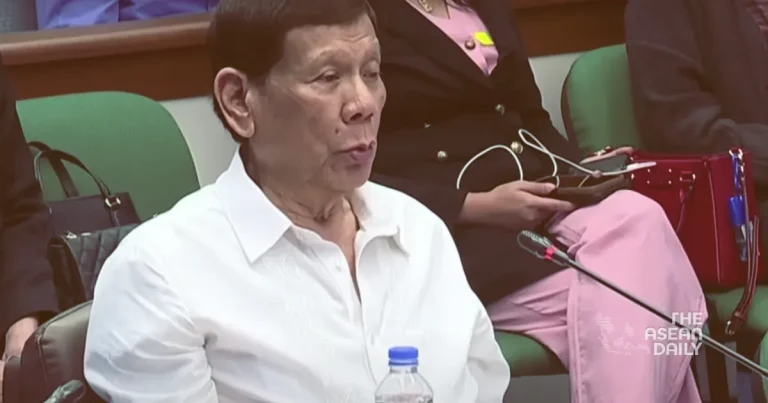2-11-2024 (MANILA) Former Philippine President Rodrigo Duterte’s dramatic nine-hour Senate testimony has sparked fresh controversy over his notorious drug war whilst exposing deepening rifts in the nation’s political landscape.
In an unprecedented hearing on 28 October, Duterte made startling admissions about his controversial anti-drugs campaign, which human rights organisations claim resulted in up to 12,000 deaths, though official police figures cite 6,000 casualties.
The former president, known for his unorthodox style, openly acknowledged directing law enforcement to provoke armed confrontations with drug suspects during his presidency. He drew direct parallels between these tactics and his previous operations as mayor of Davao, where he served for 22 years before ascending to the presidency in 2016.
“I did what I had to do for my country,” Duterte declared during his expletive-laden testimony, maintaining his characteristic defiance. His statements, which human rights lawyer Chel Diokno described as “damning,” could potentially strengthen the International Criminal Court’s ongoing investigation into crimes against humanity.
Political analysts suggest the hearing served as a platform for Duterte to reassert his influence amidst an escalating feud between his family and President Ferdinand Marcos Jr. The deteriorating relationship has been particularly evident in Vice-President Sara Duterte’s recent public criticisms of Marcos, questioning his leadership capabilities and campaign promises.
“The Senate hearing effectively provided Duterte with a stage to demonstrate his continued political relevance,” noted Michael Yusingco, senior research fellow at the Ateneo Policy Centre. “The senators’ permissive approach played directly into his hands.”
The hearing’s conduct has drawn criticism for its unusual leniency, with only opposition senator Risa Hontiveros offering robust questioning. Three pro-Duterte senators notably defended the drug war and dismissed controversial statements as mere jokes.
Political analyst Aries Arugay attributes this approach to electoral calculations, as the country enters its midterm election season. “Many senators facing re-election in 2025 are clearly mindful of Duterte’s substantial support base,” he observed.
The political drama intensifies as Duterte signals his intention to run for Davao mayor in the 2025 midterms, while his daughter maintains higher approval ratings than President Marcos despite their ongoing dispute.
The administration now faces a complex dilemma: pursuing investigations into Duterte’s admissions could alienate his supporters, while deferring to the ICC might suggest weakness in domestic justice systems. President Marcos, who previously rejected ICC jurisdiction over the Philippines, must now navigate these challenging political waters.
The hearing’s aftermath leaves President Marcos in a precarious position, forcing him to balance justice with political pragmatism in a scenario that could significantly impact the nation’s political future.




